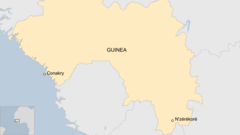In a devastating incident on Sunday, reports indicate that dozens were killed during a stampede at a football match involving local teams N'zérékoré and Labé. Prime Minister Mamadou Oury Bah confirmed that the chaos erupted following violent confrontations between fans and law enforcement, highlighting the severity of the situation as local hospitals grapple with the influx of victims.
Eyewitness accounts reveal that frustration escalated over a disputed decision by the referee, leading to panicked reactions from thousands of spectators. One witness recounted, "It all started with a contested decision by the referee. Then fans invaded the pitch." Local media reported that police resorted to using tear gas to disperse the crowd after supporters from the visiting Labé team reacted aggressively by throwing stones onto the field.
Unverified social media videos depict the frantic scene outside the stadium, showing chaotic attempts by fans to climb barriers and displaying bodies scattered on the ground, prompting urgent calls for calm from regional authorities. Prime Minister Bah announced that measures were being taken to restore order and ensure the injured received medical attention.
The match was part of a tournament honoring President Mamadi Doumbouya, who came to power through a military coup in September 2021. This tragic incident highlights the ongoing challenges facing Guinea, particularly in relation to managing public gatherings.
This incident also revives memories of one of the darkest days in Guinea's history—the 2009 stadium massacre in which 156 individuals were killed due to security forces' violent repression during an opposition rally. Moussa Dadis Camara, the former military ruler implicated in those events, was recently sentenced for crimes against humanity.
The grim outcome of the latest match once again raises critical questions about crowd control, public safety measures, and the responsibility of authorities during high-stakes sporting events in Guinea.
As the nation mourns this tragic loss, the pressing need for comprehensive reforms in managing sports events to prevent future calamities becomes more evident.
Eyewitness accounts reveal that frustration escalated over a disputed decision by the referee, leading to panicked reactions from thousands of spectators. One witness recounted, "It all started with a contested decision by the referee. Then fans invaded the pitch." Local media reported that police resorted to using tear gas to disperse the crowd after supporters from the visiting Labé team reacted aggressively by throwing stones onto the field.
Unverified social media videos depict the frantic scene outside the stadium, showing chaotic attempts by fans to climb barriers and displaying bodies scattered on the ground, prompting urgent calls for calm from regional authorities. Prime Minister Bah announced that measures were being taken to restore order and ensure the injured received medical attention.
The match was part of a tournament honoring President Mamadi Doumbouya, who came to power through a military coup in September 2021. This tragic incident highlights the ongoing challenges facing Guinea, particularly in relation to managing public gatherings.
This incident also revives memories of one of the darkest days in Guinea's history—the 2009 stadium massacre in which 156 individuals were killed due to security forces' violent repression during an opposition rally. Moussa Dadis Camara, the former military ruler implicated in those events, was recently sentenced for crimes against humanity.
The grim outcome of the latest match once again raises critical questions about crowd control, public safety measures, and the responsibility of authorities during high-stakes sporting events in Guinea.
As the nation mourns this tragic loss, the pressing need for comprehensive reforms in managing sports events to prevent future calamities becomes more evident.



















